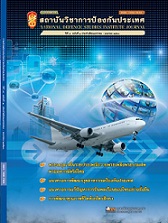แนวทางการแก้ปัญหาการบินพลเรือนของไทยอย่างยั่งยืน Sustainable Solutions for Solving Thai Civil Aviation
Main Article Content
Abstract
บทคัดย่อ
จากการที่องค์การการบินพลเรือนระหว่างประเทศ หรือ ICAO (International Civil Aviation Organization) เข้ามาตรวจสอบความปลอดภัยด้านการบินพลเรือนของไทยระหว่างวันที่ 19 – 30 มกราคม พ.ศ.2558 และได้ปรับลดอันดับความน่าเชื่อถือและประกาศติด “ธงแดง” ให้กับประเทศไทยทางเว็บไซต์ เมื่อวันที่ 18 มิถุนายน พ.ศ.2558 ซึ่งส่งผลกระทบต่อความน่าเชื่อถือและความนิยมต่อสายการบินของไทย และในระยะยาวสามารถกระทบต่อระบบเศรษฐกิจของไทยโดยรวม การแก้ไขปัญหาการบินพลเรือนจึงเป็นสิ่งจำเป็นเร่งด่วนที่ภาครัฐ และหน่วยงานที่เกี่ยวข้องต้องรีบดำเนินการ อย่างไรก็ตาม การดำเนินการที่ผ่านมาเป็นการแก้ไขปัญหาแบบเร่งด่วน ไม่ยั่งยืน และเป็นไปได้ที่ปัญหา “ธงแดง” อาจจะเกิดขึ้นซ้ำอีกในอนาคต ด้วยเหตุนี้ ผู้วิจัยจึงมีความสนใจที่จะศึกษาแนวทางการปัญหาการบินพลเรือนของไทยอย่างยั่งยืน โดยได้นำแนวคิดทฤษฎีเชิงระบบทั่วไป (General System Theory) ของ Bertalanffy (1937) มาใช้เป็นกรอบในการวิเคราะห์กระบวนการแก้ไขปัญหาการบินพลเรือนของไทยอย่างเป็นระบบ การศึกษานี้ใช้เทคนิคการวิจัยเชิงคุณภาพ (Qualitative Research Methodology) ในการรวบรวมข้อมูลและวิเคราะห์ข้อมูลจากเอกสารต่าง ๆ ที่เกี่ยวข้อง รวมถึงได้ดำเนินการสัมภาษณ์เชิงลึก (In-depth Interview) กับผู้ให้ข้อมูลสำคัญที่เกี่ยวข้องกับการแก้ไขปัญหาการบินพลเรือนของไทย จำนวนทั้งสิ้น 10 คน จากการศึกษาพบว่า การแก้ไขปัญหาการบินพลเรือนของไทยในช่วงเวลาที่ผ่านมายังไม่คืบหน้าเท่าที่ควร เนื่องจากเป็นการแก้ไขปัญหาแบบเร่งด่วน และไม่เป็นระบบ ซึ่งการศึกษานี้ ได้เสนอแนวทางในการแก้ไขปัญหาการบินพลเรือนอย่างยั่งยืน ตามกรอบของทฤษฎีเชิงระบบ รวมถึงได้เสนอแนวทางการพัฒนาการบินพลเรือนของไทยให้เป็นที่ยอมรับของนานาชาติ
คำสำคัญ: มาตรฐานความปลอดภัยด้านการบิน, การบินพลเรือน, ทฤษฎีเชิงระบบ, กระบวนการจัดการ
Abstract
According to the auditing of ICAO (International Civil Aviation Organization) during 19th – 30th January 2015, Thai’s aviation safety ranking has been downgraded and formally declared a “Red Flag” on ICAO public website on 18th June 2015. This crisis has affected the credibility and popularity of the airlines of Thailand, and it can be a long-term impact on the overall Thai’s economy. In solving the crisis, it is required that related public sectors and other relevant authorities have to urgently carry out the operations. However, the past actions were just a quick fix and do not guarantee that the "Red Flag" will not occur again in the future. For this reason, the researcher was so interested in finding sustainable solutions for solving this issue, and adopted the Bertalanffy (1937)’s System Theory as the base analysis framework for this study. The qualitative research methodology was applied in collecting and analyzing data. The data were gathered from related documents and from performing in-depth interview with 10 key informants. The results showed that, in the midst of solving the Thai’s civil aviation issue, little progresses had been done since the problems were not resolved in systematic way. The recommendation part of this study, based on the System Theory, proposed sustainable solutions for solving Thai’s civil aviation issue. Moreover, it also provided guidelines for the development of Thai’s civil aviation to be recognized internationally.
Key Words: Aviation Safety Standards, Civil Aviation, System Theory, Management Process
Article Details
The articles, images, tables, graphs, written content, and opinions published in this journal are solely those of the authors and do not necessarily reflect the views or positions of the National Defence Studies Institute or its academic affiliates.


